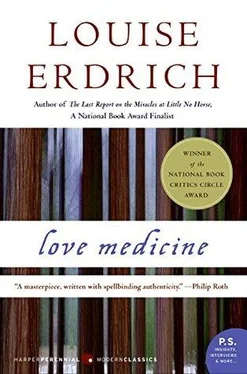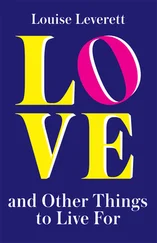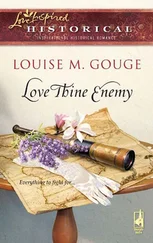Louise Erdrich - Love Medicine
Здесь есть возможность читать онлайн «Louise Erdrich - Love Medicine» весь текст электронной книги совершенно бесплатно (целиком полную версию без сокращений). В некоторых случаях можно слушать аудио, скачать через торрент в формате fb2 и присутствует краткое содержание. Год выпуска: 2005, Издательство: Harper Perennial Modern Classics, Жанр: Современная проза, на английском языке. Описание произведения, (предисловие) а так же отзывы посетителей доступны на портале библиотеки ЛибКат.
- Название:Love Medicine
- Автор:
- Издательство:Harper Perennial Modern Classics
- Жанр:
- Год:2005
- ISBN:нет данных
- Рейтинг книги:3 / 5. Голосов: 1
-
Избранное:Добавить в избранное
- Отзывы:
-
Ваша оценка:
- 60
- 1
- 2
- 3
- 4
- 5
Love Medicine: краткое содержание, описание и аннотация
Предлагаем к чтению аннотацию, описание, краткое содержание или предисловие (зависит от того, что написал сам автор книги «Love Medicine»). Если вы не нашли необходимую информацию о книге — напишите в комментариях, мы постараемся отыскать её.
Love Medicine — читать онлайн бесплатно полную книгу (весь текст) целиком
Ниже представлен текст книги, разбитый по страницам. Система сохранения места последней прочитанной страницы, позволяет с удобством читать онлайн бесплатно книгу «Love Medicine», без необходимости каждый раз заново искать на чём Вы остановились. Поставьте закладку, и сможете в любой момент перейти на страницу, на которой закончили чтение.
Интервал:
Закладка:
Nothing ever hurt me like the day Lyman walked into my trailer with mud in his hair. The worst thing was, every time I think back, that Henry junior died by drowning. I could not get it from my head. Old Man Pillager told me, when we were on the closest terms, how drowning was the worst death for a Chippewa to experience. By all accounts, the drowned weren’t allowed into the next life but forced to wander forever, broken shoed, cold, sore, and ragged. There was no place for the drowned in heaven or anywhere on earth. That is what I never found it easy to forget, and that is also the reason I broke custom very often and spoke Henry junior’s name, out loud, on my tongue.
I wanted him to know, if he heard, that he still had a home.
Nector Kashpaw did not die by drowning, but he wandered for a while.
Blind in my room I mourned Nector, although I knew we had really parted long ago, on the night my dogs tore the meat scraps out of his hands and then started in on him. I heard their brute cries following him over the next hill, out of my life. I screamed so hard inside, laughing at the cartoon picture of him running, that I had to stuff the corner of the pillow between my teeth. But after that night I thought he couldn’t truly hurt me, even with his death.
It surprised me, after all, how much I felt.
There were so many things I never cried for. I knew if I started now I would have to waste all the rest of my last years. Besides that there weren’t tears in me. I was incapable. The operation had my eyes so dried out. I was going to get someone to put the drops in, for Lyman said he couldn’t. I wasn’t ever supposed to stoop down, scream, or jig again because the stitching in my eye might slip.
That is why, after the funeral, when Nector came back from the other side to visit me, I kept still.
It was an odd time to remember doctor’s orders, but I’d never been in quite the situation. Naturally I couldn’t see him, but I woke up the minute he whispered my name. It was how he’d sometimes come to me in the old days, making his way through the window so soundlessly he’d be underneath my covers just as I woke up, and then I’d turn … And he was there like so long ago. I remembered the doctor’s advice to keep still. I felt the long weight of Nector, cold with the chill of early morning, and I smelled the lilac bath soap on his hands.
All through my room the moths had hit their eyes. I felt their soft presences and the breeze of their fanning wings, tufted feelers, and the night passed in his arms, and the darkness did not lift.
New worlds, I thought, beyond this. Things of which I’d never heard.
Yet, when morning had apparently come, life went on even more usual than usual. I had put in my request for an aide at the desk but they didn’t have enough aides for all who needed them.
That’s why Marie volunteered to take care of me. She knocked that morning. I let her in.
Things are new even at the age when we are supposed to have seen everything. We sat down for coffee and listened to the early morning music hour on the radio. I thought her voice was like music in itself, ripe and quiet. I had gotten so good at listening I appreciated just the sound of it. I gave her a pillow I’d made out of those foam rubber petals they sell in kits.
“This is real nice,” she said. “I never learned how to do this kind of thing.”
“You were always too busy taking children in,” I told her.
Then there was something I had to get off my chest.
“I appreciate you coming here to help me get my vision,” I said.
“But the truth is I have no regrets.”
“That’s all right.” She was almost impersonal in her kindness.
Her voice had lightened. “There’s a pattern of three lines in the wood.”
I didn’t understand, so she put it another way.
“Somebody had to put the tears into your eyes.”
We fell to hearing the music again.
She did not mention Nector’s funeral. We did not talk about Nector.
He was already there. Too much might start the flood gates flowing and our moment would be lost. It was enough
“Just to sit there without words. We mourned him the same way together. That was the point. It was enough. For the first time I saw exactly how another woman felt, and it gave me deep comfort, surprising. It gave me the knowledge that whatever had happened the night before, and in the past, would finally be over once my bandages came off.
She got my eye drops from the table. I tipped my head back and felt her gently peel the tape from my cheeks. She wiped my eyes with a warm washcloth. I blinked. The light was cloudy but I could already see.
She swayed down like a dim mountain, huge and blurred, the way a mother must look to her just born child.
CROSSING THE WATER r.J a S (1984) 1.
HOWARD KASHPAW He watched the women in their blue nightgowns with the jars on their heads. They went around and around the bathroom in rows.
Sometimes they disappeared behind the cabinets, the toilet tank, Or tub, but always they came out in single file again. They never stumbled.
They never had to steady their jars. Their calm tread calmed him. Below the cracked tiles they walked in seamless gowns.
Now and then, outside, his father kicked the table.
“He’s busted out again. I’m sunk.”
A note that sounded childish even to the child was in the voice.
Spoons, bowls, ashtrays, and bottles clinked together. That was not so bad. The bad part was his big voice ripping out, then getting childish.
His mother screamed.
“What about us? What about us?”
— mom She said his father could only think about himself. She screamed until the women on the wall trembled. King junior’s nightmare was to see their jars crack or their arms fall off while she screamed.
But this did not happen. The miracle was that they stayed put together, flowing forward, moving around him in a circle.
In school, they called him Howard. It happened like this: The first grade teacher had said to his mother,
“Your boy is very bright, Mrs. Kashpaw. Did you teach him how to read?”
“I don’t know how he learned it,” his mother had said. “Unless from thatfV program.”
King Junior watched everything, but Sesame Street was what taught him.
He read the backs of cereal boxes, labels on cans, the titles in her love magazines. He was ahead of the other children in kindergarten, and so they put him in the first grade.
“King Howard Kashpaw, junior,” said his new teacher.
“Which of those names would you like to be called?”
He had never thought about it.
“Howard,” he was surprised to hear himself answer. It was that simple.
After that he was Howard at school.
They were cutting out red paper hearts one afternoon. Hearts to tack up on the bulletin boards. The teacher had a black Magic Marker. One by one the children went up to his desk and used his Magic Marker to write their name s in the center of their hearts.
The sharp-smelling ink soaked into the paper. PERMANENT, it said on the marker’s label. “That means forever,” said the teacher when Howard asked. “It won’t erase.”
“Good,” said Howard.
He sat down and watched the teacher tape his heart on the wall. The wall was green. Placed against the wall, oddly, the heart seemed to pulse. In and out. He stared at the heart with his name firmly inside of it, and suddenly something moved inside of him. He felt a ‘olt of strangeness. For a moment he was heavy, full of meaning.
Howard was sitting there. Howard was both familiar and different.
Howard was living in this body like a house.
Howard Kashpaw.
At home, the blue women continued to circle. A neighbor had come by and hit the door with a broom handle. Their voices went down after that.
Читать дальшеИнтервал:
Закладка:
Похожие книги на «Love Medicine»
Представляем Вашему вниманию похожие книги на «Love Medicine» списком для выбора. Мы отобрали схожую по названию и смыслу литературу в надежде предоставить читателям больше вариантов отыскать новые, интересные, ещё непрочитанные произведения.
Обсуждение, отзывы о книге «Love Medicine» и просто собственные мнения читателей. Оставьте ваши комментарии, напишите, что Вы думаете о произведении, его смысле или главных героях. Укажите что конкретно понравилось, а что нет, и почему Вы так считаете.












